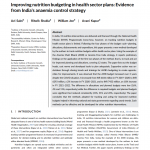
Making High Policy in Secret
30 December 2016
In my last blog, I has asked how policies were actually made in the government. The answer is, they are made confidentially. Or at least, all efforts are made to keep matters confidential.
Passionate advocates for transparency and accountability – there is a natural presumption here that both go hand in hand; it is presumption that I refute – will rail at this. But it is clear that setting the rules of the game, beyond a point, cannot be taken through a totally transparent process.
Confidentiality is necessary in policy decisions, because every such decision creates winners and losers out of stakeholders. In most cases, one cannot give losers advance warning, so that they can artificially position themselves as winners. Of course, hints can be dropped that one or the other policy is on the way, so that those who inadvertently make mistakes, or are found to be on the wrong side of policy can make the necessary corrections.
So what exactly do I mean by these abstract thoughts?
Let me give you an example; and there cannot be any better than the current demonetisation exercise.
Let us picture that we were the Prime Minister and we were against the menace of black money. Surely, we would be making speeches and delivering warnings that black money is a menace and that those who accumulate black money will be at risk of being caught and punished.
What are the current instrumentalities that we have on hand to deliver on this threat?
We could intensify raids on those who are suspected to hold black money. They could be our fellow politicians, our industrialist friends who funded our party’s political campaign. They could be our relatives. The risks of going against individuals are plenty. For one thing, we could alienate them for life. Second, raids and investigations are costly to conduct and coordinate. Furthermore, they involve large numbers of people to actually conduct them, and unreliable people in the implementation chain could play havoc by allowing criminals to escape. We also have the example of a previous Prime Minister trying such tactics and that leading to him losing his seat. I speak of Prime Minister V.P. Singh.
So then, we are looking at a path breaking, broad spectrum instrument that can deliver effectively, have a surprise effect and also create political ripples, by reinforcing your reputation as a doer.
Demonetisation presents itself as a pretty good tactic, if judged by these yardsticks. It is the mosquito spray, as opposed to raids, which are like attempting to slap mosquitoes into oblivion.
But then, mosquito sprays have this odd knack of killing a lot of innocent, useful insects as well.
Clearly, they need to be protected. Or if their populations reduce, they need to be nurtured back to the balance that existed.
Which means demonetisation has to be quickly followed by re-monetisation – an injection of balance.
But remonetisation of an extraction of 86 percent of currency in the system is a gargantuan exercise. Certainly, it is not going to be achieved unless there are massive arrangements downstream. Printing arrangements have to be readied, ATMs have to be re-calibrated, Banks have to be on their toes and perceptions have to be managed through the media, to mitigate against rumours, or your political rivals turning on you.
How are you going to manage that?
Utmost secrecy is the answer.
But then, utmost secrecy will also place accountability squarely on yourself, if something goes wrong.
In my next blog, I explore whether there can be a compromise between maintaining utmost secrecy and collective decision making.





